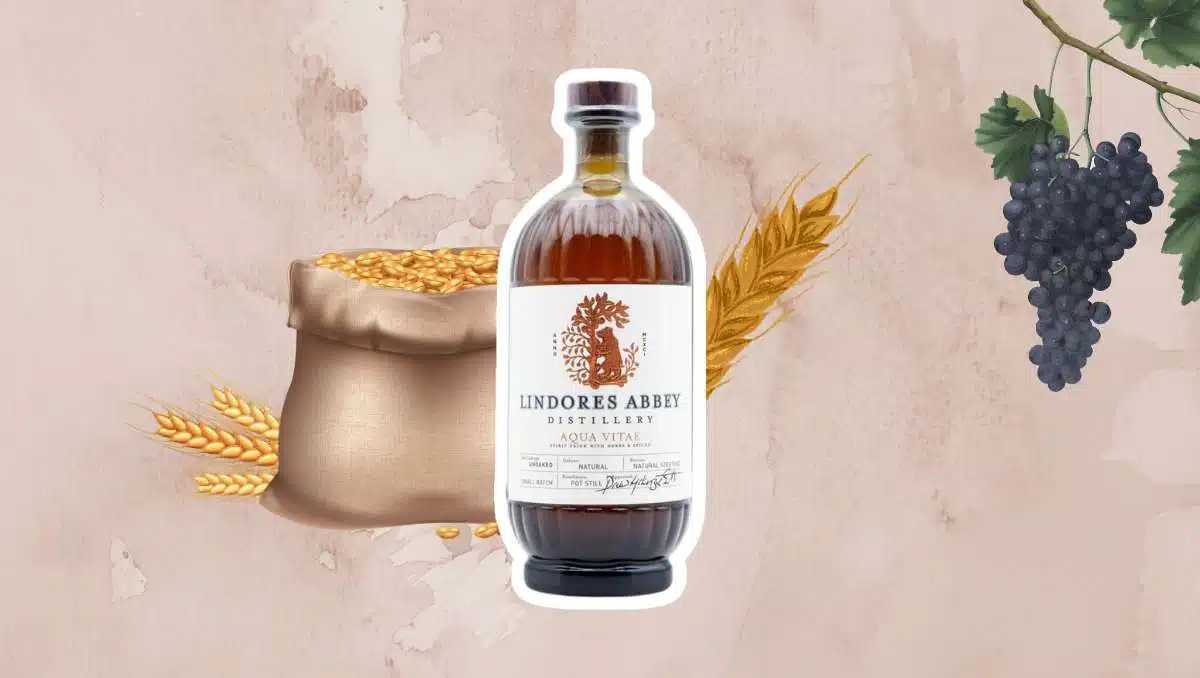The term Aqua Vitae (pronounced "aa·kwuh vee-tahy") describes a range of distilled spirits and alcoholic herbal infusions. It has a long history with roots dating back to the Roman Empire, where it stood for various distilled spirits as well as for baptism water.
However, over time the meaning of the term evolved and then described a variety of alcoholic beverages. And as the Roman Empire expanded its territory, the term traveled with it.
The word Aqua Vitae translates to water of life and is present in many languages, like the Gaelic uisce beatha, French eau de vie, Scandinavian akvavit, or the Italian aquavite. Also, in Russia, Ukraine, Belarus, and Poland, you can find variations of it. And what all have in common is they stand for a local kind of distilled spirit.
What is Aqua Vitae?
Aqua Vitae is an old term describing many different types of distilled spirits. Traditionally, these spirits were made by distilling wine, a technique also used to produce brandy.
However, that's just a fraction of what Aqua Vitae is or can be, as, in fact, it could be anything. For example, the Scottish version is based on malt, and some consider it the predecessor of Scotch Whisky. Or the Scandinavian akvavit is typically based on grains or potatoes.
What Does Aqua Vitae Mean?
Aqua Vitae is Latin and literally translates to water of life. The spirit got that name because it initially had medical purposes like supporting digestion and relieving pain.
Alchemists like John of Rupescissa and Taddeo Alderotti chose the name Aqua Vitae as they believed they discovered a new quintessence: A life-giving elixir with multiple medical use cases.
Origin
Let's start with the Roots of Aqua Vitae in the Roman Empire. The Romans used the word to describe distillation products and baptismal waters. Later, when the Romans conquered more and more land, people living there adopted the term.
Later medieval alchemists started experimenting with distillation processes and ingredients and created new types of distilled spirits. And they often used wine or other lower ABV beverages to distill a higher-proof liquor. They also infused these liquors with manifold ingredients like herbs, plants, rinds, roots, flowers, and spices. Of that, they created herbal spirits that partly exist today. -Green Chartreuse is one of those. consisting
Many of the ingredients were said to have medical properties. So it isn't surprising that the distilled spirit got used for curing illnesses. For instance, Taddeo Alderotti, an alchemist who lived in the 13th century, created a potion distilled from wine.
According to Alderotti, his creation was 'the mother and mistress of all medicines'. And even though his version of an Aqua Vitae was certainly not that powerful, by drinking a bit every day, he reached the age of 87. Not that impressive today, but back in the day, that must have seemed nearly impossible. After all, life expectancy in the 13th century was just around 30 years.
The Pre-Decessor of Whisky
About 200 years later, in the 1500s, Brother John Cor from Lindores Abbey was asked to produce Aqua Vitae for King James IV. He ended up creating the first-ever version of Scotch Whisky.
Out of 500kg of malt, he made around 400 bottles of Whisky. And, of course, as it was the custom, the spirit contained infusions of various plants, herbs, and spices.
The malt-based spirit got mainly used as an anesthetic. Soon King James IV grew more interested in the medical properties of his Aqua Vitae and decided to produce it in large quantities. In that course, he set up the 'Royal College of Surgeons' and gained the exclusive rights to manufacture Aqua Vitae.
Aqua Vitae - The Mother of all Spirits and Liqueurs
Aqua Vitae was more than a general term for distilled spirits. It was also a term that described complex mixtures based on it. Today, we call such products liqueurs. So basically, it's not only a forerunner of spirits but also liqueurs.
Green Chartreuse, the complex liqueur made by the monks of the order of Chartreux, is just one example of a more modern Aqua Vitae. And despite being quite elaborate, Green Chartreuse doesn't even come close to the most complex recipes out there.
To give you an idea of the dimension we're talking about: The Danish princess, Anne of Saxony, created one of the most complex and thought-out recipes. Her white Aqua Vitae creation asked for nothing less than 387 different ingredients. After a 9-step distillation process that took over two years, the final product was ready for consumption. If one were to make her yellow version, it would require 28 additional ingredients and six more months of aging.
And people soon realized that, besides the medical benefits, the alcohol in the distillates made them drunk. From then on, the consumption of these strong liquors grew quickly, often for pleasure or for the "prevention of diseases."
Aqua Vitae today
Aqua Vitae is the forerunner of most modern spirits and liqueurs. Here's. quick overview of spirits that are more or less directly linked to the mother of all spirits:
- Whisky or Whiskey
- Vodka
- Brandy
- Grappa
- Akvavit
Some of the products remain more traditional than others. Scandinavian Akvavit, for example, is produced very similarly to how it was in the 15th century. Also, the distillery of Lindores Abbey started to produce its Aqua Vitae again, using old procedures.
Mainly because their Whisky needs time to age and rest before it can be sold and, but also to keep traditions alive.
Aqua Vitae in Cocktails
Aqua Vitae is an excellent ingredient in cocktails. We all know that modern forms like whiskey, brandy, vodka, and grappa work great in mixed drinks, but you can also make cocktails with the more traditional version.
Lindores Abbey has a nice collection of summer cocktails made with Aqua Vitae. If you need more inspiration, try out these drinks:

